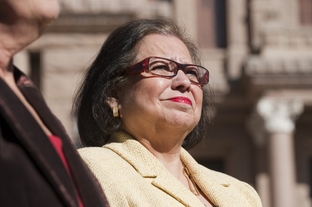A New Fight to SAVE Texas' Elections is Brewing

In the ongoing disputes over voter ID, is the federal government a friend or a foe? The answer might depend on what comes next.
Certainly, Democrats and other opponents of the bill — which would require that most voters furnish a photo ID before casting their ballots — discovered an ally when the Department of Justice found that the law would infringe on the voting rights of minorities and others and refused to preclear it. That led to a subsequent showdown in federal court that has been argued but has yet to be resolved.
The relationship between opponents and the feds could change if the Department of Homeland Security gives state officials a database with millions of immigration records and citizenship information. Texas officials have requested access to the Systematic Alien Verification for Entitlements, or SAVE, database, which will be “one of many important resources for confirming voter eligibility,” according to Texas Secretary of State Esperanza “Hope” Andrade's written request to DHS Secretary Janet Napolitano. Hypothetically, the database could be used to strike noncitizens from the voter rolls without requiring photo IDs.
Opponents of voter ID aren’t taking the request lightly, despite their repeated assertions that voter fraud is a phantom problem. If only people who should vote are voting, as opponents of voter ID claim, why not hand over the SAVE information?
“What if it’s flawed? How many legitimate voters are going to get purged?” said Rebecca Acuña, the communications director for the Texas Democratic Party. “There is a possibility that legitimate voters can get purged. If we know, based on their own studies, in-person voter fraud does not exist, then one [legitimate voter] getting purged is too many.”
State Rep. Trey Martinez Fischer, D-San Antonio, the chairman of the Mexican American Legislative Caucus, said he has yet to form an opinion on the issue, but would like to know exactly what the state wants the information for.
“[The secretary of state’s office] has a limited statutory authority and if they are doing something that’s exceeding their authority we’d like to know,” he said. “If what they’re doing is so harmless and doesn’t have the effect of disenfranchising voters, we can clear that up in a very quick and cordial conversation.”
Just in case, however, Martinez Fischer already has a solid defense in mind: the state’s own legal position on databases.
“In closing arguments on July 13, 2012 [during the voter ID trial], the State of Texas said a database matching project is hopelessly flawed and not a valid methodological approach to determining the answer to anything,” he said.
The secretary of state is aware of the concerns, and in a letter to Martinez Fischer, Andrade appeared open to discussing the SAVE data.
“The SAVE verification process as we understand it is not a stand alone database which can be ‘matched’ to the state’s voter registration database,” she wrote. “It is a tool used by federal state and local agencies to verify a person’s eligibility for whatever they are seeking from the government. This is not a database per se that we will ‘match’ with the voter registration database. As we understand it, it is an additional tool to use to verify someone’s citizenship status once they self-identify as a non-citizen in response to a jury summons.”

